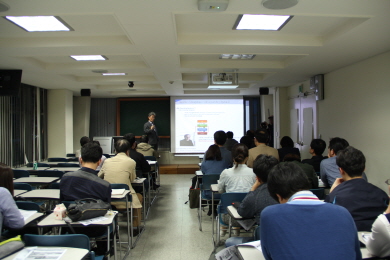
On March 22, Ewha Womans University was ranked first in the 2016 University Social Responsibility Index conducted by Korea Social Responsibility Network (KSRN) and Tomato Corporate Social Responsibility Research Center. This evaluation was made not based on alumni and employment rates, but focused on fulfillment of social responsibilites. Social responsibility refers to an obligation for an organization or individual to act for society at large, and can cover a variety of categories ranging from advocacy of minority rights and care for the local area. Recently, social responsibilities of universities and university students have become more important, due to the social perception that university students are a much more influential and noted social group than in the past, as the percentage of young people attending university has tripled in the last 30 years. In this article, Ewha Voice will explore how universities are meeting their social responsibilities, as well as some of the ways of university students are getting more involved in society, and how we can contribute more to the society as a educational community.
Universities pursue social responsibilities
Last year, Korea University provided an entrepreneur education program for North Korean defectors. The program aspired to educate defectors on business enterprise, and guide them to establish their own start-up companies. With the help of J.P. Morgan, which funded the program with 250 million won, the program was initiated in 2015 with 100 students.
Currently, 18 students have successfully finished the curriculum, and six amongst them will continue to receive 20 million to 45 million won to aid their start-up. Additionally, Korea University will be providing three more years of consultation, general monitoring and education for the individuals to deal with business matters after the official establishments.
This program is just one of many community programs that universities in Korea provide in contribution to the general society. As stated in the International Meeting on Social Responsibility of Universities in 2013, statements and declarations of social responsibilities regarding universities have attracted people’s attention over the past few years. Consequently, universities are also progressively enhancing their influence on society by providing education not just for enrolled students, but for a wider range of people, especially those underprivileged.
In Hanyang University, Professor Cho Byung-wan organized a program dedicated to teaching IoT (Internet of Things) and AI (Artificial Intelligence) to people with visual disabilities. The free 12-week program educates blind students with a general understanding of the technological field, aging from 33 to 63.
“Opportunities for those with visual disabilities to learn IoT do not come around everyday,” said Jeon Hee-won, a Soongsil University professor currently in the course of IoT and AI at Hanyang University. Jeon highly praised the program, stressing the importance of creating opportunities for people with disabilities to get educated in specific fields.
“I believe that universities’ social responsibility lies in its contribution toward social development and progression,” Professor Cho said. “Along with their duty of raising intellectuals, they should also take part in eliminating a variety of society ills.”
For Professor Cho, one way of achieving such a goal is to provide the blind with the opportunity of education in IT. This is precisely why he chose to change the original Engineering Department program offered to a selection of 30 CEOs to a free program for those with visual impairments.
“There seemed to be many devices that can enhance convenience for those with visual disabilities,” Professor Cho said. “Although done in good heart, these small convenient enhancements are not all that helpful. Rather, a means of sustainable independence is more important.”
Ewha also has been endeavoring to fulfill its obligation of social responsibilities.
Founded in 1956, the Ewha Community Welfare Center is the nation’s first university-affiliated social welfare center. Since its establishment, it has developed and delivered various programs including special services for everyone old or young, whilst providing opportunities to acquire experience and knowledge of the social work field.
“As our President Choi Kyung-hee stated in an interview before, ‘In Korean society, universities have worked hard to fulfill their responsibilities in higher education, but not so much in the inner maturation of their students,’” said a correspondent of the center. “As she said, based on the social responsibilities of universities in this era, we believe that as a university Ewha should step up to be a community that can contribute to the bigger society.”

